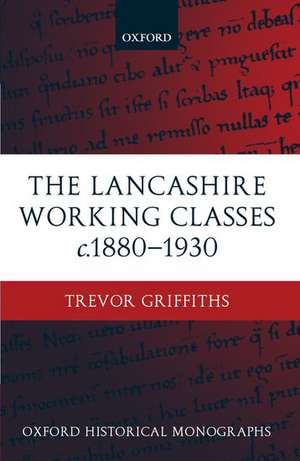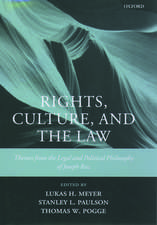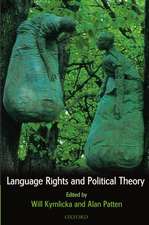The Lancashire Working Classes c.1880-1930: Oxford Historical Monographs
Autor Trevor Griffithsen Limba Engleză Hardback – 4 oct 2001
Din seria Oxford Historical Monographs
- 30%
 Preț: 497.26 lei
Preț: 497.26 lei - 12%
 Preț: 310.34 lei
Preț: 310.34 lei - 30%
 Preț: 539.99 lei
Preț: 539.99 lei - 15%
 Preț: 244.01 lei
Preț: 244.01 lei - 13%
 Preț: 532.53 lei
Preț: 532.53 lei - 30%
 Preț: 499.46 lei
Preț: 499.46 lei - 30%
 Preț: 497.67 lei
Preț: 497.67 lei - 30%
 Preț: 499.18 lei
Preț: 499.18 lei - 30%
 Preț: 498.68 lei
Preț: 498.68 lei - 30%
 Preț: 604.98 lei
Preț: 604.98 lei - 30%
 Preț: 497.63 lei
Preț: 497.63 lei - 24%
 Preț: 496.31 lei
Preț: 496.31 lei - 30%
 Preț: 498.68 lei
Preț: 498.68 lei - 22%
 Preț: 497.81 lei
Preț: 497.81 lei - 25%
 Preț: 556.27 lei
Preț: 556.27 lei - 14%
 Preț: 539.57 lei
Preț: 539.57 lei - 30%
 Preț: 500.29 lei
Preț: 500.29 lei - 13%
 Preț: 533.57 lei
Preț: 533.57 lei - 25%
 Preț: 569.72 lei
Preț: 569.72 lei - 30%
 Preț: 610.82 lei
Preț: 610.82 lei - 34%
 Preț: 1153.34 lei
Preț: 1153.34 lei - 51%
 Preț: 614.88 lei
Preț: 614.88 lei - 34%
 Preț: 1195.31 lei
Preț: 1195.31 lei - 34%
 Preț: 1035.84 lei
Preț: 1035.84 lei - 34%
 Preț: 1006.40 lei
Preț: 1006.40 lei - 34%
 Preț: 864.39 lei
Preț: 864.39 lei - 34%
 Preț: 1160.09 lei
Preț: 1160.09 lei - 34%
 Preț: 1432.67 lei
Preț: 1432.67 lei - 31%
 Preț: 328.46 lei
Preț: 328.46 lei - 34%
 Preț: 573.88 lei
Preț: 573.88 lei - 34%
 Preț: 1067.93 lei
Preț: 1067.93 lei - 34%
 Preț: 1004.62 lei
Preț: 1004.62 lei - 31%
 Preț: 329.49 lei
Preț: 329.49 lei - 34%
 Preț: 1153.28 lei
Preț: 1153.28 lei - 34%
 Preț: 1254.66 lei
Preț: 1254.66 lei - 34%
 Preț: 946.79 lei
Preț: 946.79 lei - 34%
 Preț: 962.63 lei
Preț: 962.63 lei - 34%
 Preț: 1126.38 lei
Preț: 1126.38 lei - 31%
 Preț: 469.27 lei
Preț: 469.27 lei - 23%
 Preț: 332.04 lei
Preț: 332.04 lei - 28%
 Preț: 374.93 lei
Preț: 374.93 lei - 34%
 Preț: 1049.14 lei
Preț: 1049.14 lei - 34%
 Preț: 1036.73 lei
Preț: 1036.73 lei - 51%
 Preț: 757.67 lei
Preț: 757.67 lei - 34%
 Preț: 1082.61 lei
Preț: 1082.61 lei - 34%
 Preț: 1155.39 lei
Preț: 1155.39 lei - 31%
 Preț: 328.53 lei
Preț: 328.53 lei - 34%
 Preț: 1110.12 lei
Preț: 1110.12 lei - 31%
 Preț: 487.75 lei
Preț: 487.75 lei - 34%
 Preț: 1153.41 lei
Preț: 1153.41 lei
Preț: 391.00 lei
Preț vechi: 566.49 lei
-31% Nou
Puncte Express: 587
Preț estimativ în valută:
74.82€ • 78.31$ • 62.27£
74.82€ • 78.31$ • 62.27£
Carte tipărită la comandă
Livrare economică 19-25 martie
Preluare comenzi: 021 569.72.76
Specificații
ISBN-13: 9780199247387
ISBN-10: 0199247382
Pagini: 402
Dimensiuni: 146 x 226 x 28 mm
Greutate: 0.61 kg
Ediția:New.
Editura: OUP OXFORD
Colecția OUP Oxford
Seria Oxford Historical Monographs
Locul publicării:Oxford, United Kingdom
ISBN-10: 0199247382
Pagini: 402
Dimensiuni: 146 x 226 x 28 mm
Greutate: 0.61 kg
Ediția:New.
Editura: OUP OXFORD
Colecția OUP Oxford
Seria Oxford Historical Monographs
Locul publicării:Oxford, United Kingdom
Recenzii
... long-anticipated ... well worth the wait ... a significant contribution to the burgeoning social history of the Lancashire working class ... will be drawn upon in a range of debates on the historical sociology of work, the periodisation of class formation, the character of British working-class culture and on the contested relationship between social structures and political behaviour.
... considerable analytical skill and a rigorous attention to empirical detail ... absorbing and challenging ... innovative analysis of labour markets, recruitment and the search for work.
... an impressive, meticulously researched book ... Everyone interested in social and labour history, not only in Lancashire but far beyond, will find much to engage with in it.
A rich and rewarding book.
A valuable and substantial contribution ... Historians of the North will value the wealth of research reported in the text and detailed in the impressive bibliography. Social historians will benefit from the links drawn between this work and the debates which have engaged them for the past twenty years.
His ingenious statistical analysis of the 286 households affected by the [Pretoria Pit] disaster ... displays the historians' craft at its best.
... this is a very good and scholarly first work.
All of the book's eight chapters engage with and challenge the existing historical literature and are skillfully linked to produce a challenging conclusion.
... the book makes excellent use of a very wide range of employers' records, trade union data, and other material.
Griffith's book will be seen by many as another welcome addition - and indeed important variation - on the corpus of literature which seeks to extend the frontiers of historical analysis of industrial communities by recourse to identity rather than social class.
The research is thorough, the interpretation inspired and the argument sustained in what constitutes a readable and fascinating contribution.
Overall, Griffiths has produced a significant and valuable addition to the ongoing discussion of working-class development, as well as an extensive survey of Lancashire working-class attitudes, activities and lifestyles. In so doing, he has extended, but not concluded, the ongoing debate.
Extensive and meticulous examination of the Lancashire working class ... an important and informative study.
Original and compelling.
Griffiths marshalls an impressive range of documentary evidence to argue for the continuities of key aspects of working-class life over this fifty year period ... a particularly interesting chapter on the labour market and the 'search for work'.
Gives a fascinating insight into the realities of working class life ... incisive.
This book is an important contribution to the social history of Lancashire as well as the wider debate about social class in Britain ... it should be read by a wide variety of social historians and it represents a stimulating contribution to the question, 'was there a British working class or working classes?'
... considerable analytical skill and a rigorous attention to empirical detail ... absorbing and challenging ... innovative analysis of labour markets, recruitment and the search for work.
... an impressive, meticulously researched book ... Everyone interested in social and labour history, not only in Lancashire but far beyond, will find much to engage with in it.
A rich and rewarding book.
A valuable and substantial contribution ... Historians of the North will value the wealth of research reported in the text and detailed in the impressive bibliography. Social historians will benefit from the links drawn between this work and the debates which have engaged them for the past twenty years.
His ingenious statistical analysis of the 286 households affected by the [Pretoria Pit] disaster ... displays the historians' craft at its best.
... this is a very good and scholarly first work.
All of the book's eight chapters engage with and challenge the existing historical literature and are skillfully linked to produce a challenging conclusion.
... the book makes excellent use of a very wide range of employers' records, trade union data, and other material.
Griffith's book will be seen by many as another welcome addition - and indeed important variation - on the corpus of literature which seeks to extend the frontiers of historical analysis of industrial communities by recourse to identity rather than social class.
The research is thorough, the interpretation inspired and the argument sustained in what constitutes a readable and fascinating contribution.
Overall, Griffiths has produced a significant and valuable addition to the ongoing discussion of working-class development, as well as an extensive survey of Lancashire working-class attitudes, activities and lifestyles. In so doing, he has extended, but not concluded, the ongoing debate.
Extensive and meticulous examination of the Lancashire working class ... an important and informative study.
Original and compelling.
Griffiths marshalls an impressive range of documentary evidence to argue for the continuities of key aspects of working-class life over this fifty year period ... a particularly interesting chapter on the labour market and the 'search for work'.
Gives a fascinating insight into the realities of working class life ... incisive.
This book is an important contribution to the social history of Lancashire as well as the wider debate about social class in Britain ... it should be read by a wide variety of social historians and it represents a stimulating contribution to the question, 'was there a British working class or working classes?'














